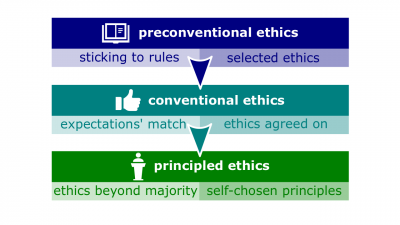Difference between revisions of "Mental-model development"
| Line 1: | Line 1: | ||
| − | [[File:Moral-development.png|400px|thumb|right|[[Moral development]]]][[Moral development]] (hereinafter, the ''Model'') is a [[model]] that describes the process of developing ethical behaviors. | + | [[File:Moral-development.png|400px|thumb|right|[[Moral development]]]][[Moral development]] (hereinafter, the ''Model'') is a [[learning model]] that describes the process of developing ethical behaviors. |
==Levels== | ==Levels== | ||
| − | # | + | #'''Preconventional level'''. The lower level of the ''Model'' in which a person's choice between right and wrong is based on personal consequences from outside forces or, in other words, is extrinsically motivated. This ''level'' consists of two stages: (a) sticking to rules to avoid punishment and (b) following the rules only when doing so is in the person's interest. |
| − | # | + | #'''Conventional level'''. The middle level of ''Model'' in which a person's choice between right and wrong relies on maintaining expected standards and living up to the expectations of others, or, in other words, is cooperatively motivated. This ''level'' consists of two stages: (a) living up to what the people close to the person expect and (b) maintaining conventional order by fulfilling obligations to which the person agrees. |
#[[Principled level]]. The upper level of ''Model'' in which a person's choice between right and wrong is based on the person's own moral values apart from authority of the groups to which he or she belongs or society in general, or, in other words, is intrinsically motivated. This ''level'' consists of two stages: (a) valuing rights of others and upholding absolute values and rights regardless of the majority's opinion and (b) following self-chosen ethical principles even if they violate the law. | #[[Principled level]]. The upper level of ''Model'' in which a person's choice between right and wrong is based on the person's own moral values apart from authority of the groups to which he or she belongs or society in general, or, in other words, is intrinsically motivated. This ''level'' consists of two stages: (a) valuing rights of others and upholding absolute values and rights regardless of the majority's opinion and (b) following self-chosen ethical principles even if they violate the law. | ||
Revision as of 15:10, 9 November 2019
Moral development (hereinafter, the Model) is a learning model that describes the process of developing ethical behaviors.
Levels
- Preconventional level. The lower level of the Model in which a person's choice between right and wrong is based on personal consequences from outside forces or, in other words, is extrinsically motivated. This level consists of two stages: (a) sticking to rules to avoid punishment and (b) following the rules only when doing so is in the person's interest.
- Conventional level. The middle level of Model in which a person's choice between right and wrong relies on maintaining expected standards and living up to the expectations of others, or, in other words, is cooperatively motivated. This level consists of two stages: (a) living up to what the people close to the person expect and (b) maintaining conventional order by fulfilling obligations to which the person agrees.
- Principled level. The upper level of Model in which a person's choice between right and wrong is based on the person's own moral values apart from authority of the groups to which he or she belongs or society in general, or, in other words, is intrinsically motivated. This level consists of two stages: (a) valuing rights of others and upholding absolute values and rights regardless of the majority's opinion and (b) following self-chosen ethical principles even if they violate the law.
